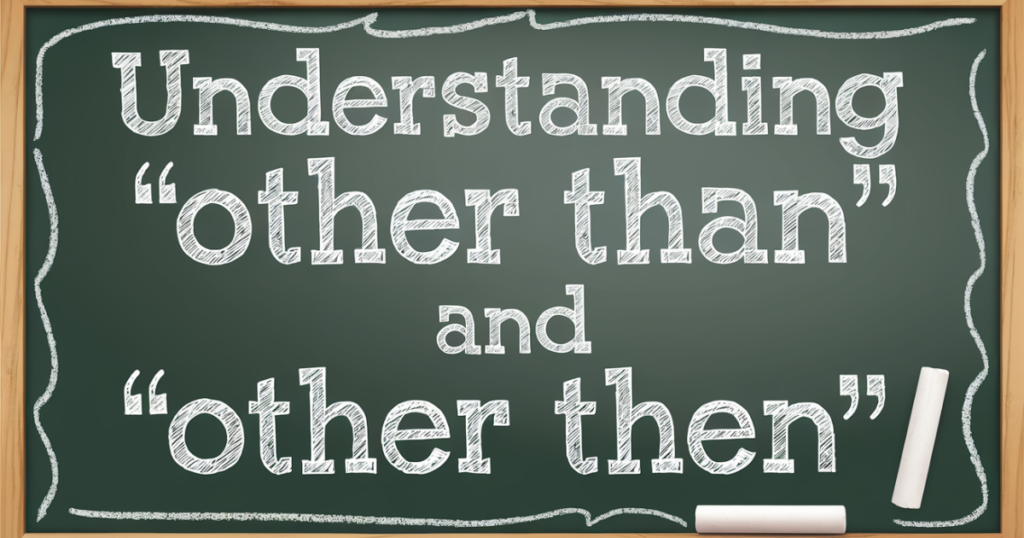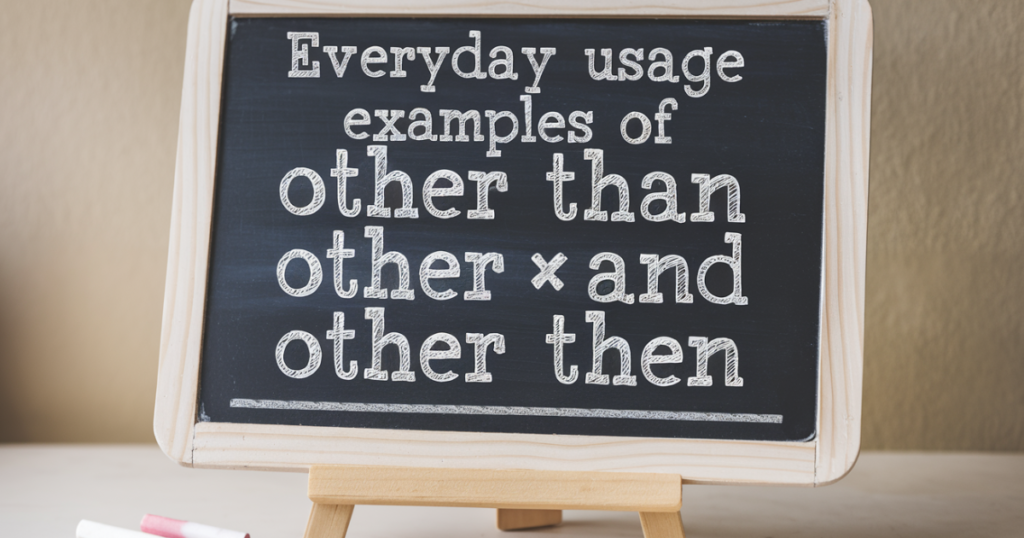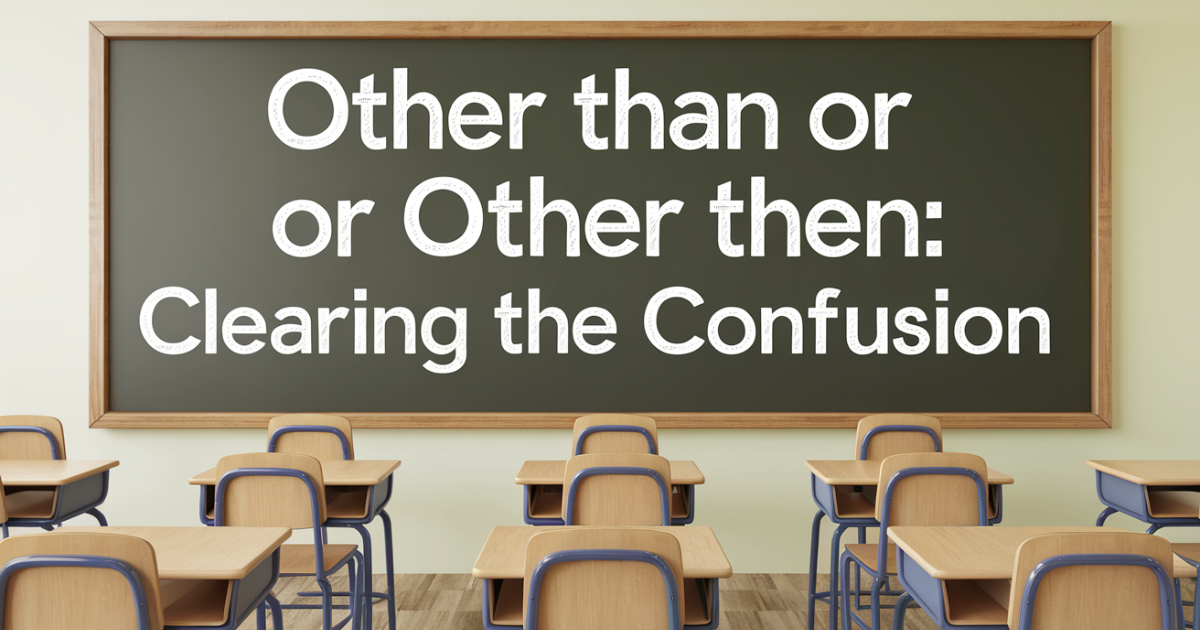When it comes to the phrases other than or other then, many people often find themselves puzzled about the correct usage. Although they sound similar, these expressions have distinct meanings and functions in English. “Other than” is used to indicate exceptions or alternatives, while “other then” is not a standard phrase in English and can lead to confusion in communication.
In this article, we will clarify the differences between these two phrases, providing clear definitions and examples to help you understand their appropriate contexts. By the end, you’ll be equipped to use “other than” correctly and avoid the common pitfalls associated with the incorrect phrase “other then.”
Understanding “Other Than” and “Other Then”

Other Than: Definition and Usage
“Other than” is a prepositional phrase used to indicate an exception or alternative to something previously mentioned. It often introduces a contrast or distinguishes one thing from another. This phrase helps clarify that a specific item or group does not fit within the stated criteria.
Usage Examples:
- Other than the weather, the picnic was a great success.
- I have no other options than to accept the job offer.
Other Then: Common Misuse
“Other then” is a common misuse that arises from confusion with the correct phrase “other than.” In English, “then” refers to a time or sequence, while “other than” indicates exceptions or alternatives. Using “other then” can lead to ambiguity and unclear communication, as it does not convey a meaningful concept.
Many writers mistakenly use this incorrect phrase in place of the intended “other than,” which can diminish the clarity of their writing. To avoid this error, it’s essential to remember that “other than” is the only correct form when discussing exceptions or alternatives.
- I can’t think of any other then the two suggestions already made.
(Correct usage: I can’t think of any other than the two suggestions already made.) - Other then that, everything went smoothly during the event.
(Correct usage: Other than that, everything went smoothly during the event.)
You Like To Read This: Journeys or Journies? Breaking Down The Terms
Side-by-Side Comparison
Here’s a side-by-side comparison of “Other Than” and “Other Then” to clarify their correct usage and common mistakes:
| Term | Correct Usage | Common Misuse | Explanation | Key Difference |
| Other Than | ✔️ Correct | — | “Other than” indicates exceptions or alternatives. | Used to distinguish between items or options. |
| Other Then | — | ❌ Incorrect | “Other then” is a misuse; “then” refers to time or sequence. | Incorrectly combines “other” with a time-related word. |
“Other than” is the proper phrase used for expressing exceptions or alternatives, while “other then” is a common error that fails to convey a meaningful idea.
Everyday Usage Examples

Here are some everyday usage examples for the correct term “other than”:
- Other than her regular job, she also volunteers at the animal shelter.
- There’s no option other than to accept the terms of the agreement.
- Other than studying, he enjoys playing basketball on weekends.
- I don’t have any hobbies other than reading and gardening.
- Other than the cost, the new phone has many great features.
- She didn’t see anyone else other than her close friends at the party.
- Other than a few minor issues, the project was a success.
These examples illustrate how “other than” can effectively highlight exceptions or alternatives in various contexts. Whether discussing personal interests, responsibilities, or preferences, this phrase helps clarify what is included or excluded.
FAQs
What is the difference between “other than” and “other then”?
The phrase “other than” is used to indicate exceptions or alternatives, highlighting what is not included in a particular context. In contrast, “other then” is a common misspelling and does not convey a meaningful idea; “then” pertains to time or sequence.
What are the synonyms of ‘other than’?
Synonyms for “other than” include phrases like “besides,” “except for,” “apart from,” and “aside from.” These alternatives can be used interchangeably in many contexts, depending on the sentence structure. Using synonyms can enhance your writing and provide variety while conveying the same meaning.
Is “other then” ever correct to use in a sentence?
No, “other then” is not considered correct in standard English usage. The word “then” refers to a time or sequence, making it inappropriate when attempting to convey exceptions or alternatives. To ensure clarity, always use “other than” in such contexts.
Are there any exceptions where “other then” is considered correct?
There are no exceptions where “other then” is considered correct in standard English. The phrase does not exist in proper usage and can lead to confusion. It’s essential to stick with “other than” to express alternatives or exceptions accurately.
Are there synonyms for “other than” that might be easier to use?
Yes, simpler synonyms for “other than” include “besides,” “except,” and “apart from.” These alternatives are straightforward and can make your writing more accessible. Using such synonyms can help convey the same message while maintaining clarity and simplicity.
Conclusion
In summary, understanding the difference between “other than” and “other then” is crucial for effective communication. “Other than” serves to indicate exceptions or alternatives, while “other then” is an incorrect phrase that should be avoided. Using the correct terminology ensures clarity and helps prevent confusion in both written and spoken contexts.
Moreover, being aware of synonyms like “besides,” “except for,” and “apart from” can enhance your language skills. These alternatives can provide variety and make your writing more engaging. By mastering these distinctions, you can communicate your ideas more clearly and effectively.

Grammerlytips.com, authored by Jame, offers expert tips and insights on mastering grammar, enhancing writing skills, and boosting communication effectiveness.

